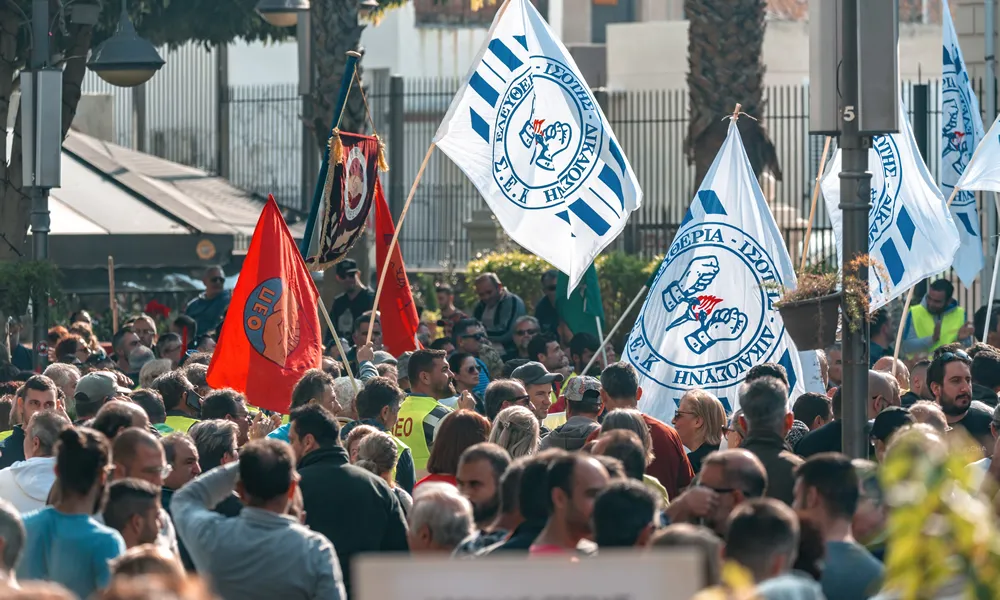As Cyprus enters the era of flexible employment and digital transformation, the role of trade unions faces new scrutiny. Yet, their relevance remains, particularly as younger generations navigate a rapidly changing labour market. Despite this, union participation among young workers stays low, with limited data or public discussion on the issue. How do unions view this gap? What are they doing to attract younger members? And how “aged” is the union movement today?
Politis spoke with Stelios Polydorou, Youth Secretary of SEK (Cyprus Workers’ Confederation), and Christos Tombazos, Central Organisational Secretary of PEO (Pancyprian Federation of Labour), about these questions.
Low participation, shifting attitudes
Polydorou admits participation among young members of SEK remains relatively low compared to older workers, a trend mirrored across Europe. “There’s still significant room for improvement,” he says. “But more young employees now express interest, ask questions, and want to understand what unions do. This growing curiosity is a sign of recognition and respect for our work. It also reminds us that unions must renew, adapt, and modernise their approach.”
Tombazos notes that participation depends largely on workplace structures: “Where collective agreements exist and workers are organised, young people also participate. The issue is that many young people work in sectors without union presence new, fast-growing industries employing skilled workers but without collective protection. Our research shows that young people are not unorganised by choice, but because these sectors lack established union mechanisms.”
Representation and workplace presence
SEK currently has no dedicated youth committees in workplaces, Polydorou explains, but tries to involve young workers through local committees. “One of our biggest challenges is the constant job mobility among young people. They rarely stay long enough in one workplace to be trained and become active. Stability is key to building youth representation structures, one of our goals for the future.”
Tombazos describes a more structured approach at PEO. “We encourage young participation in local and sectoral committees. The union’s mechanisms have been renewed significantly in recent years. We also maintain a specialised Youth Labour Office that deals with broader issues beyond work, such as housing and social policy. This year’s youth conference brought together 150 young workers from across sectors.”
Information gap and trust
Do young people keep their distance from unions? “Yes, to some extent,” Polydorou says. “But this often stems from lack of information or a general crisis of trust in institutions. Once they learn about their rights and the unions’ role, attitudes change. Many realise collective action is essential, especially in a volatile labour market.”
Tombazos agrees: “Young people in organised workplaces do participate. Distance from unions isn’t ideological, it’s structural.”
Attracting new members
According to Polydorou, outreach strategies must adapt to Cyprus’s multicultural workforce. “We have employees from many different countries, so our approach varies. Reaching Cypriot youth can be harder because our education system doesn’t cultivate ideas of solidarity and collective action. Many young Cypriots value individuality and competitiveness, so trust must come first. They need to meet us, talk with us, and understand our purpose before joining. By contrast, many European workers here contact us directly through social media, already recognising our role.”
He adds that SEK focuses on in-person workplace visits, direct communication, active use of social media, and campaigns around core youth concerns for fair wages, stable employment, and work-life balance.
Tombazos says PEO pursues similar goals through awareness campaigns about the meaning of being organised and knowing one’s labour rights. “But awareness alone isn’t enough. Young workers must believe in their collective power and take responsibility for their future. The union is not something that works for them; it’s something they are part of.”
Freelancers and platform work
Both unions acknowledge that the rise of freelancing and platform-based jobs poses new challenges. “We are studying these realities,” says Polydorou. “We’ve begun efforts to organise delivery workers and secure their rights. The same applies to freelancers, we push for legal protections through institutional dialogue.”
Tombazos highlights a recent win: “We supported delivery workers and achieved a historic collective agreement, mostly benefiting migrant workers. These forms of employment, especially the so-called ‘service contracts,’ make organising harder, but with persistence, change is possible. The 10-year struggle of education programme workers is proof: after strikes and mobilisation, they regained employee status.”
Are unions “too old”?
Polydorou acknowledges the criticism but insists renewal is underway. “Unions are still essential, but they must evolve. The presence of young leaders and an active youth wing within SEK shows that renewal is happening from within. If young people see unions as old-fashioned, the answer is not to abandon them, it’s to join and transform them.”
Tombazos disagrees with the label entirely. “At PEO’s upcoming 29th Congress in December, over 600 delegates will shape the union’s strategy for the next four years, with special focus on youth issues. Young delegates will be elected to represent their sectors. The congress motto, Work with rights and dignity, speaks directly to the new generation.”
